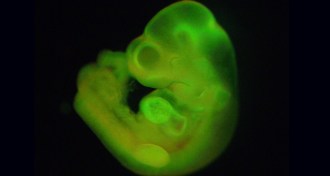News in Brief
-
 Neuroscience
NeuroscienceBrain’s growth, networks unveiled in new maps
Two large-scale efforts describe human and mouse brains in detail.
-
 Health & Medicine
Health & MedicineStatins may improve erectile function
Although doctors had been concerned that statins were associated with erectile dysfunction, an analysis of 14 studies finds that the drugs may actually help erectile function.
By Nathan Seppa -
 Health & Medicine
Health & MedicineCeliac disease linked to heart problems
Inflammation may explain the link between celiac disease, a digestive disorder, and coronary artery disease.
By Nathan Seppa -
 Science & Society
Science & SocietyMisconduct found in Japanese stem cell research
An investigation into reports describing a type of stem cells called STAP cells has found that the lead researcher is guilty of scientific misconduct.
-
 Psychology
PsychologyTwenty-two emotions are written on our faces
People’s faces express at least 22 feelings – far more than the six emotions scientists previously recognized.
By Meghan Rosen -
 Health & Medicine
Health & MedicineDaylight saving time linked to heart attacks
Hospital admissions for heart attacks increases after daylight savings time starts, a study suggests.
By Nathan Seppa -
 Health & Medicine
Health & MedicineDiet fix eases Huntington’s symptoms in mice
Supplement improves health of rodents with mutation that causes neurodegeneration like that seen in Huntington’s disease.
-
 Life
LifeWith Taxol, chromosomes divide and get conquered
New mechanism discovered for how the cancer drug Taxol works.
-
 Paleontology
PaleontologyAncient oceans’ top predator was gentle filter feeder
New fossils suggest that a distant relative of lobsters used bristled limbs to net its prey, not spike it.
-
 Planetary Science
Planetary ScienceIcy planetoid found lurking at edge of solar system
Astronomers discovered an icy planetoid orbiting beyond the edge of the Kuiper belt.
-
 Life
LifeWhen hummingbirds fly unfriendly skies
Hummingbirds hover easily in turbulent air as long as the disturbances aren’t too wide.
By Susan Milius -
 Health & Medicine
Health & MedicineE-cigarettes don’t help smokers quit, study finds
People who tried e-cigarettes no more likely to give up smoking a year later.
By Nathan Seppa